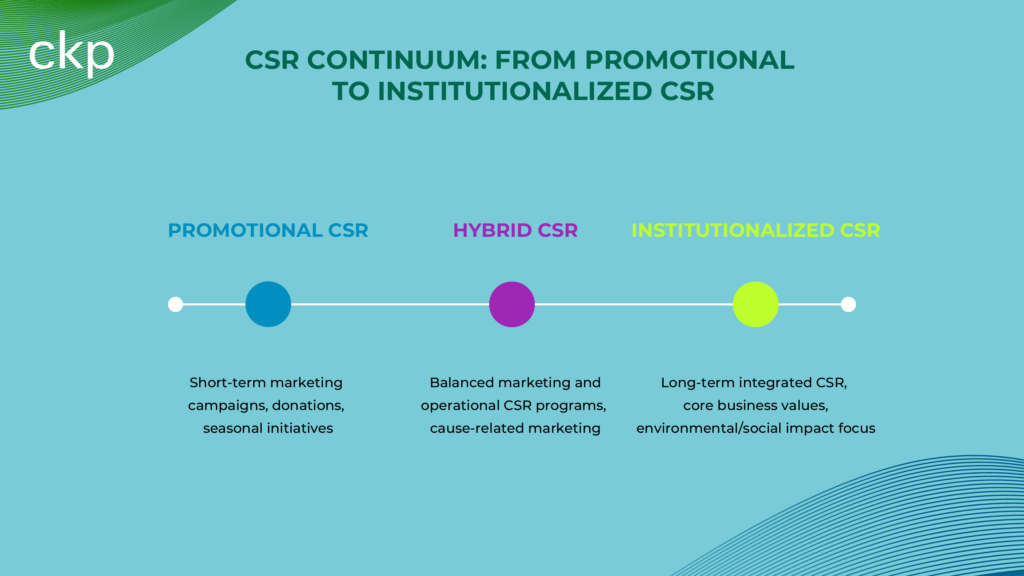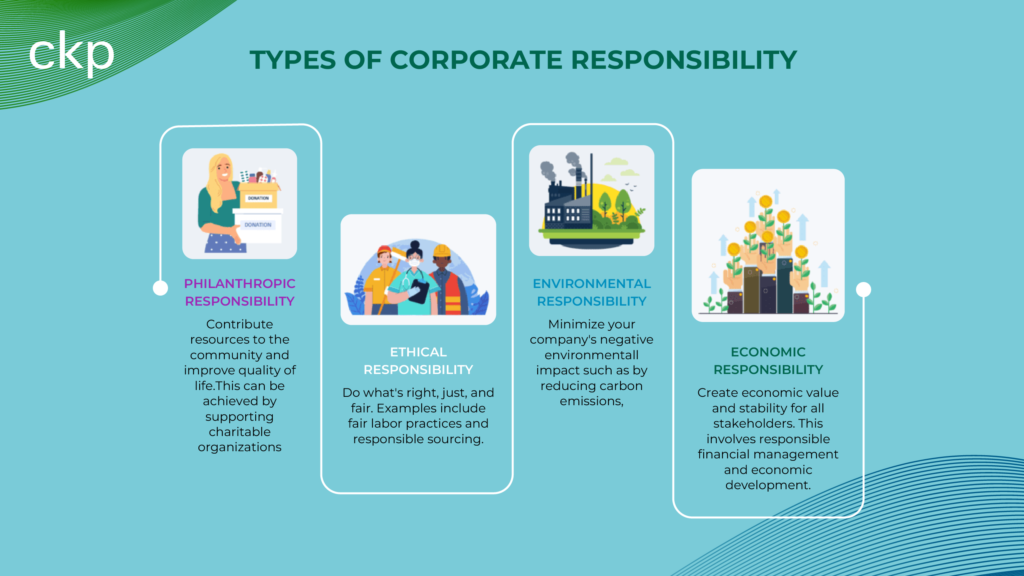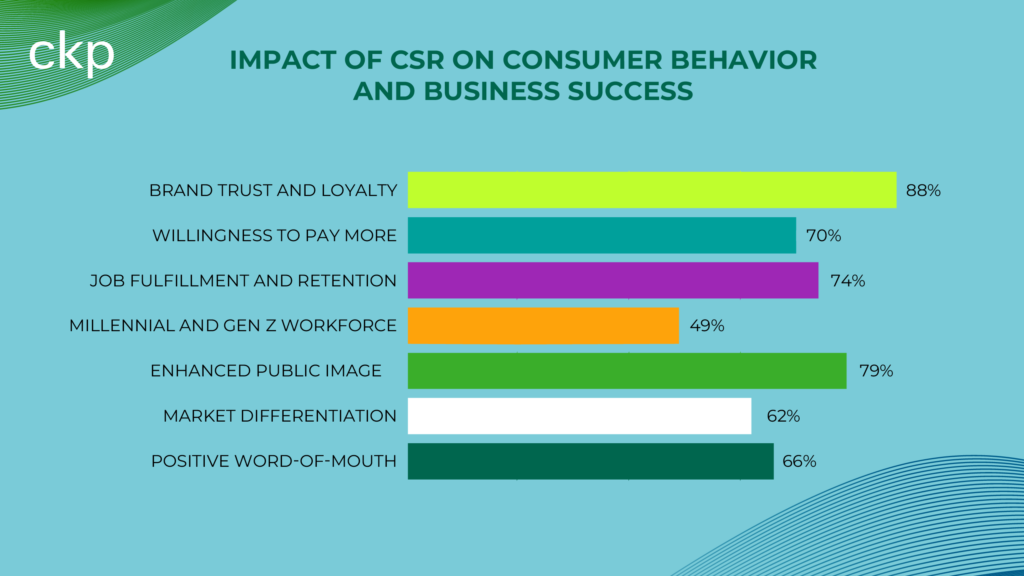Turning Criticism into Loyalty: The Transformative Power of Corporate Social Responsibility

Corporate Social Responsibility is a relatively new trend, yes? Wrong.
The concept of Corporate Social Responsibility (CSR) has its roots in the mid-20th century, though businesses have always had some form of societal engagement. As we know it today, the modern version of the CSR movement began to take shape in the 1950s and 1960s, when scholars like Howard Bowen introduced the idea that businesses have a responsibility beyond profit-making to contribute positively to society. This marked a shift from purely philanthropic efforts like charitable donations to more strategic engagement with broader social, environmental, and economic issues, among others, that are intrinsically tied to a brand’s identity.
Fun fact: When he founded his chocolate company in 1894, Milton Hershey exemplified early corporate social responsibility by actively investing in the well-being of his employees and the broader community. He designed a company town that included a park and recreational facilities, and he established a community greenhouse and plant nursery. By offering cheap credit, he enabled many employees to become homeowners. In 1909, Hershey and his wife Catherine founded the Milton Hershey School for orphans, which today continues servicing more than 2,000 in-need students across 14 grades tuition-free. These initiatives went beyond profit-making, showcasing Hershey’s commitment to improving lives and highlighting how some early industrialists recognized the importance of corporate social responsibility even before it was a formal concept.
Today, CSR is an expectation. Stakeholders—including customers, employees, investors, and communities—demand that businesses actively contribute positively to the communities in which they operate while minimizing negative impact. Companies that successfully integrate CSR into their business strategy gain a competitive edge, building stronger brand equity and fostering loyalty among their audiences.
Moreover, criticism is inevitable in today’s media-saturated and very online world, but how a business responds to criticism can define its reputation. This is where CSR becomes a powerful tool. Companies that proactively address social issues, listen to their critics, and implement meaningful changes can neutralize negativity.
That’s on top of generating awareness and clarifying what you stand for through goodwill.
But can it turn detractors into adopters—even raving fans? Yes. Let’s dig in. We’ll cover:
- Understanding CSR: What is it and how to think about it
- The data: Why is CSR important
- Telling the story: How to elevate your public relations game with CSR
- How to turn critics into advocates
Understanding CSR: What is it and how to think about it
Corporate Social Responsibility goes by many names, so let’s begin by acknowledging that the lack of an agreed-upon definition creates a problem. Or does it create an opportunity?
Some brands claim they’re “doing” CSR courtesy of a marketing campaign that donates a certain proceeds to a random cause, while others, like Tom’s and Warby Parker, make it a part of their customer promise with a buy-one, donate-one framework.
This is referred to as the “Institutionalized-Promotional Continuum.”

Promotional CSR programs are more focused on short-term marketing objectives and tend to be more effective at generating immediate purchase intent. Institutionalized programs, however, are more deeply embedded in the company’s operations and values and are focused on increasing customer loyalty, enhancing attitudes toward the company, and decreasing consumer skepticism.
These tactical approaches tend to fall into one or more of the following thematic categories:
- Environmental Responsibility: This type focuses on a company’s efforts to operate in an environmentally friendly manner such as reducing pollution and greenhouse gas emissions; increasing use of renewable energy and sustainable resources; and offsetting negative environmental impacts through initiatives like tree planting.
- Ethical Responsibility: This involves ensuring fair and ethical treatment of all stakeholders, including employees, customers, suppliers, and investors, such as setting higher minimum wages, sourcing products according to fair trade standards, and ensuring ethical labor practices throughout the supply chain.
- Philanthropic Responsibility: This refers to a company’s efforts to actively improve society, often through charitable giving, such as donating funds or goods to nonprofits, providing grants for employee volunteer hours, and creating charitable trusts or foundations.
- Economic Responsibility: This involves making financial decisions that positively impact society, the environment, and people, not just maximizing profits. Examples include prioritizing sourcing products from local producers, supporting employee benefits and development programs, and offering affordable products.

The key to successful CSR lies in consistency and authenticity. CSR should not feel like an opportunistic marketing tactic but rather a reflection of the company’s genuine commitment. Brands that fall short on this often face backlash as consumers can see through hollow promises. Authentic CSR, on the other hand, builds trust, fosters loyalty, and can turn even the harshest critics into passionate advocates.
The data: Why is CSR important
Numbers don’t lie, and when it comes to CSR, the statistics are revealing. Let’s delve into some compelling data that underscores why CSR should be a part of your business strategy:
- Brand Trust and Loyalty: According to the 2022 Edelman Trust Barometer, 88% of consumers believe that companies have a duty to positively impact society. Furthermore, 80% say they will choose to buy from brands they trust to “do the right thing.”
- Willingness to Pay More: A 2021 survey by IBM Institute for Business Value found that 57% of consumers are willing to change their purchasing habits to help reduce negative environmental impact. Additionally, 70% are willing to pay a premium of 35% on average for brands that are sustainable and environmentally responsible.
- Job Fulfillment and Retention: The 2016 Cone Communications Employee Engagement Study revealed that 74% of employees find their job more fulfilling when they are provided opportunities to make a positive impact at work. Companies with strong CSR programs experience up to 50% lower turnover rates.
- Millennial and Gen Z Workforce: Deloitte’s 2021 Millennial Survey indicates that 49% of Millennials and Gen Zs choose employers based on their ethics and CSR practices. They are more loyal to companies that align with their values.
- Enhanced Public Image: A 2019 Porter Novelli/Cone Purpose Biometrics Study found that 79% of Americans are more loyal to purpose-driven brands, and 73% are more willing to defend them in a crisis.
- Differentiation in the Market: Companies with strong CSR initiatives stand out. Accenture Strategy’s Global Consumer Pulse Research in 2018 found that 62% of consumers want companies to take a stand on current and broadly relevant issues like sustainability, transparency, and fair employment practices.
- Positive Word-of-Mouth: The Nielsen Global Survey of Corporate Social Responsibility and Sustainability reported that 66% of consumers are willing to share positive opinions about companies engaged in CSR, influencing others through social proof.
- Repeat Business: Loyal customers are worth up to 10 times as much as their first purchase, according to the White House Office of Consumer Affairs. CSR initiatives foster this loyalty.

There’s more.
Corporate Social Responsibility (CSR) has the remarkable ability to transform critics into brand advocates when executed authentically and transparently. 83% of consumers stated they would forgive a company for making a misstep if it handled the mistake responsibly and transparently.
Telling the story: How to elevate your PR game with CSR
If done right, crafting and sharing compelling stories around your CSR initiatives can significantly elevate your public relations (PR) efforts. Here’s how to harness the power of storytelling to amplify your CSR impact. Different platforms offer unique opportunities to tell your CSR story:
- Social Media: Use platforms like LinkedIn and Meta to share bite-sized stories, behind-the-scenes glimpses, and real-time updates. Engaging visuals and interactive content (like polls or Q&A sessions) can boost engagement.
- Video Content: Create short documentaries or testimonial videos that highlight your CSR projects. Videos are highly shareable and can convey emotions more powerfully than text alone.
- Company Blog and Newsletters: Dive deeper into your CSR initiatives with detailed articles, interviews, and impact reports. Regular updates can keep your audience informed and engaged over time.
- Media Outreach: Collaborate with journalists and influencers who are passionate about similar causes. Earned media can expand your reach to new audiences and lend additional credibility to your efforts.
- Website Portal: Develop a landing page where users can track the progress of CSR projects, participate in challenges, or contribute to your efforts.
- Nonprofit and Community Partnerships: Collaborate with reputable community organizations and nonprofits to leverage their expertise, credibility, and reach. Joint storytelling and public relations efforts can reach wider audiences and demonstrate a united front on important issues.
Turning Critics into Advocates
A hyper-connected world means consumers can voice their dissatisfaction in an instant. Criticism is a part of any company’s public life. How a business responds to criticism is critical to its long-term reputation and customer loyalty. With Corporate Social Responsibility (CSR) acting as a powerful tool for change, businesses can turn what may seem like a public relations crisis into an opportunity.
Identifying the Source of Criticism
The first step in this process is to understand where the criticism is coming from. Is it a matter of negligence? A product recall due to concerns? Missteps in diversity and inclusion practices? Once the source of criticism is identified, CSR initiatives can be designed to directly address these concerns, showing both transparency and a willingness to improve.
Critics often emerge when there is a misalignment between what a company promises and how it behaves. This is where CSR becomes invaluable. Institutionalizing CSR into the core of a company’s strategy and addressing these misalignments head-on means businesses can demonstrate accountability and begin to build bridges with their detractors.
Engaging with Critics Through Transparent Communication
Transparency is at the heart of effective CSR. In times of public criticism, the worst response a company can give is silence. Instead, companies that open a dialogue with their critics, explaining their CSR initiatives and commitments, show that they are listening and willing to engage. Honest communication about what steps are being taken to improve—whether that involves environmental reform, ethical labor practices, or philanthropic efforts—helps build trust and begins the process of turning a critic into a potential advocate.
In fact, when done properly, this kind of engagement often turns the tide of public opinion. By inviting critics into the conversation and allowing them to witness the company’s efforts firsthand, businesses can build stronger, more authentic relationships.
Strategic CSR to Address Criticism
CSR programs that directly address the concerns raised by critics are the most effective at shifting negative perceptions. For instance, if a company is criticized for its environmental practices, launching a transparent and measurable sustainability initiative can go a long way toward showing a genuine commitment to improvement. This might include reducing carbon footprints, investing in renewable energy, or establishing partnerships with environmental organizations.
On the ethical front, companies that make their supply chains more transparent or enforce higher labor standards can not only mitigate criticism but also turn skeptical consumers into advocates who now trust the brand’s commitment to doing the right thing.
A great example of this is Nike, which faced intense criticism in the 1990s for its labor practices. Rather than deflecting, Nike embraced the feedback, reformed its policies, and implemented stricter standards across its supply chain. Over time, this commitment to ethical improvement helped Nike not only regain consumer trust but also build a stronger base of brand advocates.
The Long-term Payoff: From Criticism to Loyalty
When a company’s CSR efforts are both transparent and authentically aligned with its business values, the long-term payoff can be significant. Critics who once saw the brand in a negative light begin to appreciate its efforts, and those initial detractors can turn into some of the most loyal advocates. These advocates are often vocal about their support, spreading positive word-of-mouth and amplifying the company’s CSR initiatives.
In many cases, this shift from critic to advocate creates a ripple effect. As CSR initiatives take hold and build trust with one audience, that momentum can extend to others who might have been indifferent or even critical. The result is a growing base of loyal customers who see the brand not just as a provider of goods or services, but as a positive force for social and environmental change.

Joel is a strategy-driven storyteller connecting brands to their audiences with creativity and precision. As CKP’s chief strategy officer, he helps clients thrive while sharing his expertise as an educator and thought leader.
More Blog Posts

Let’s be real—communication at work is kind of like a group chat. Some people over-share, some barely respond, and others...

Once upon a time, PR meant faxing a press release and hoping someone, somewhere, had paper in their machine. All...

Employee Appreciation Day, recognized on the first Friday in March, will be celebrated this year on March 7. It is...

1. The Power of Sustained Impression (Or: Stop Passing Out at First Dates) Let me tell you about a date...

